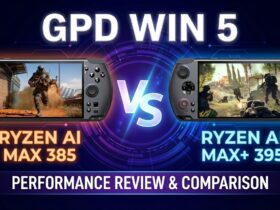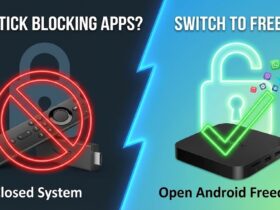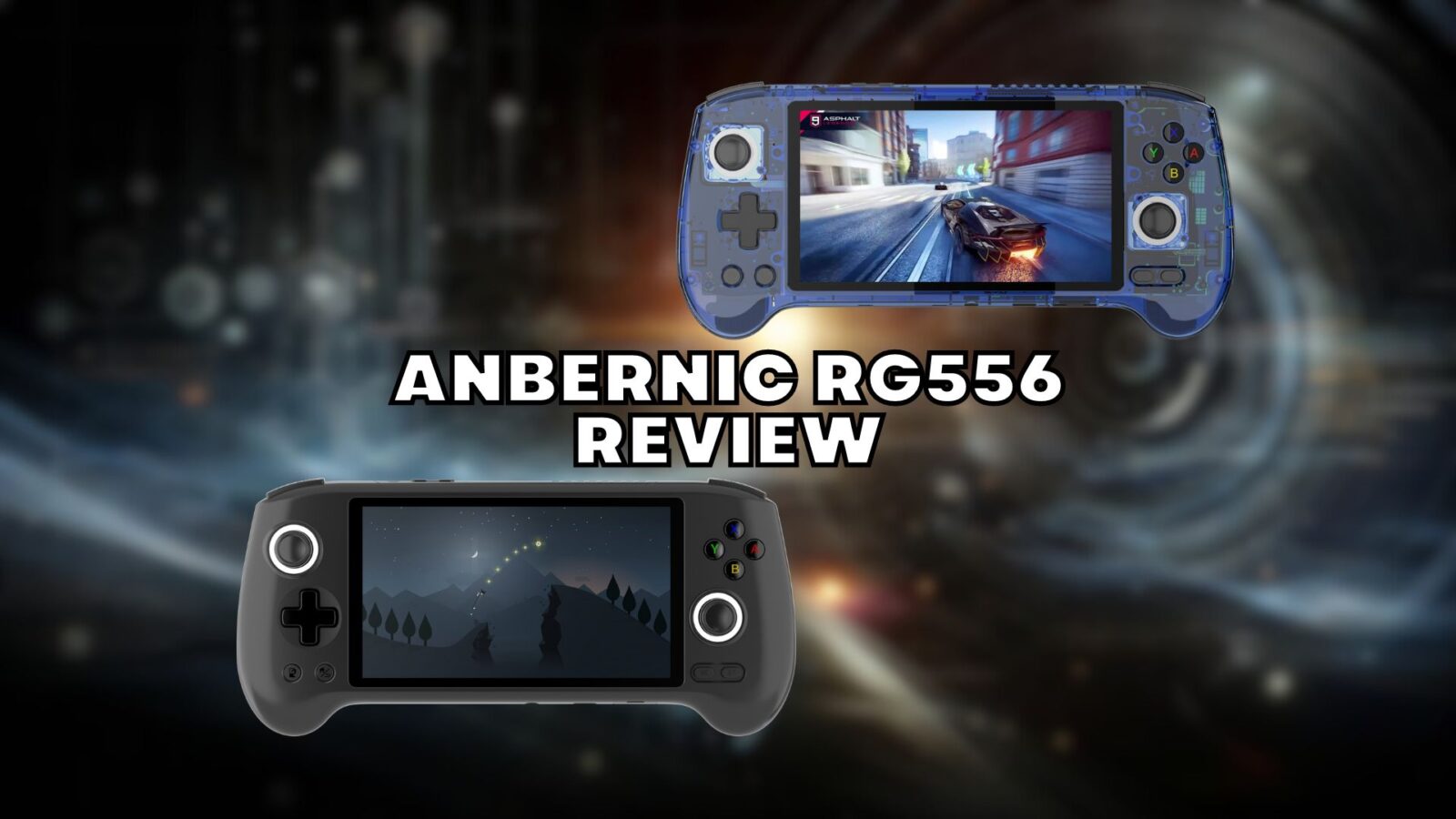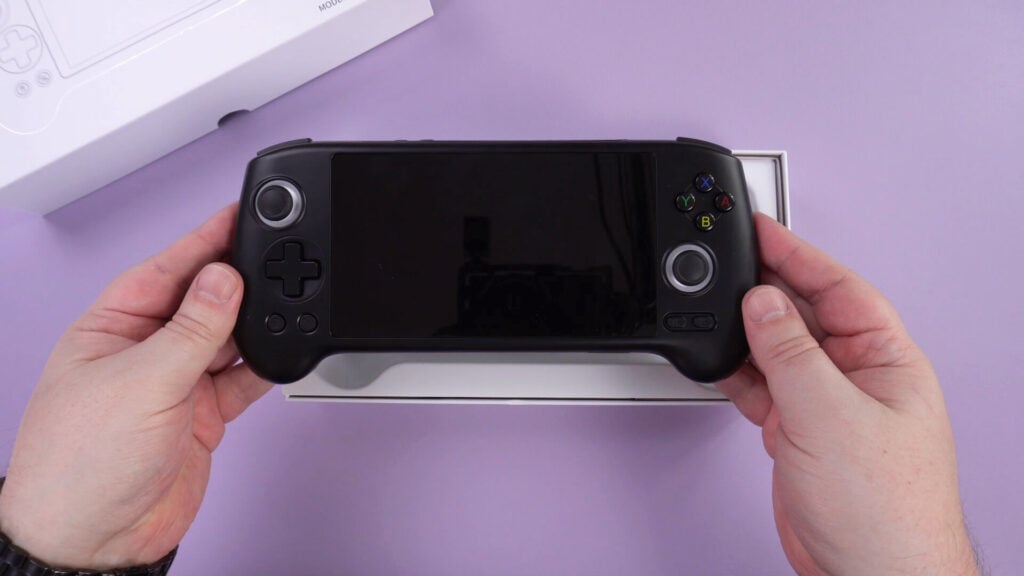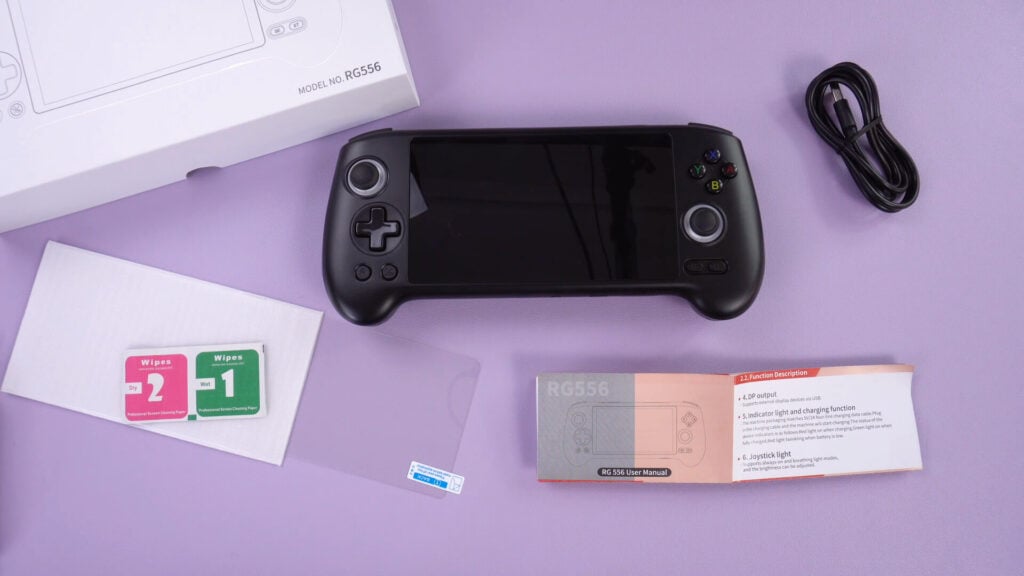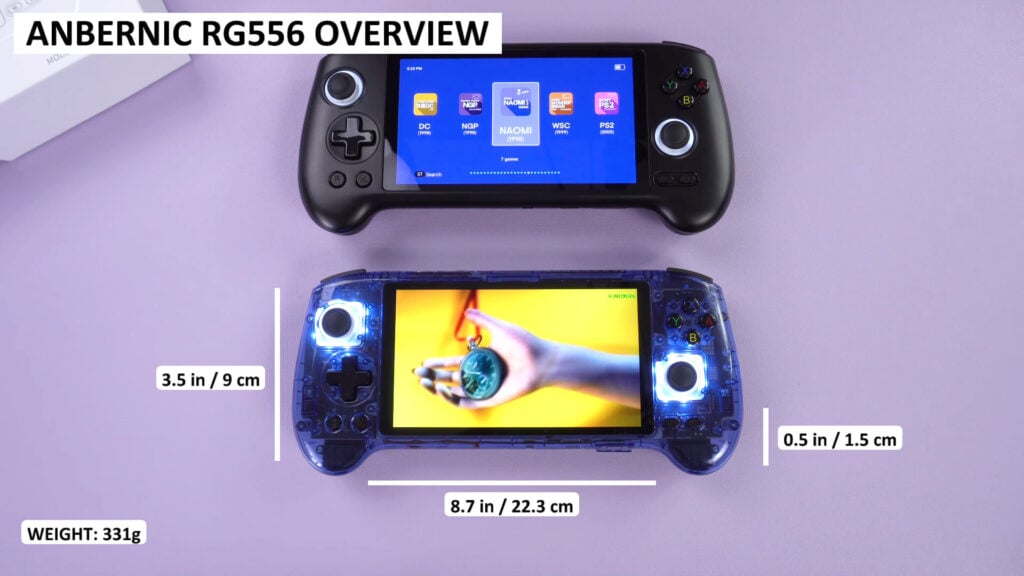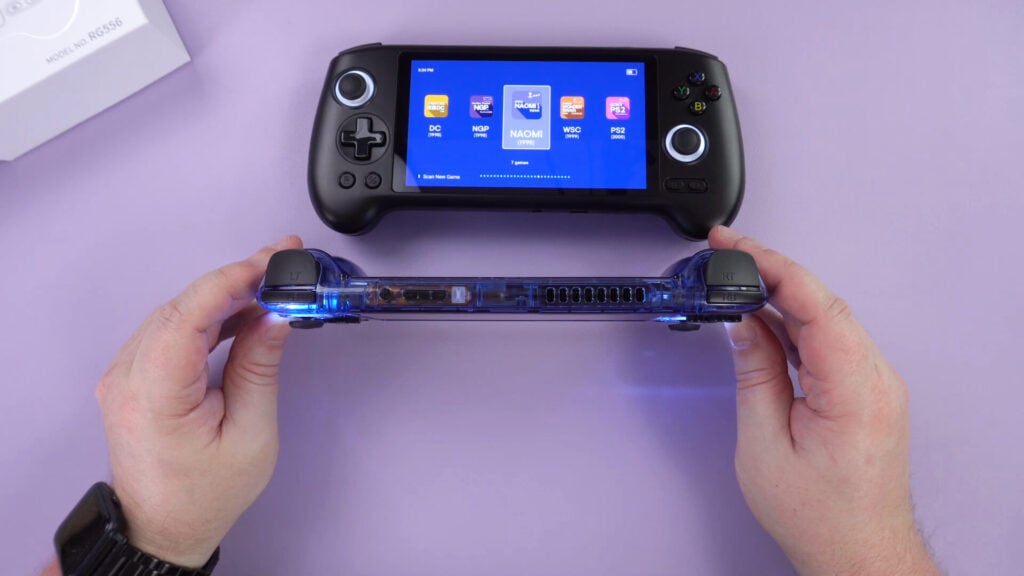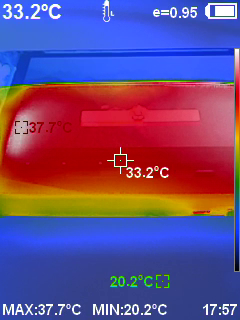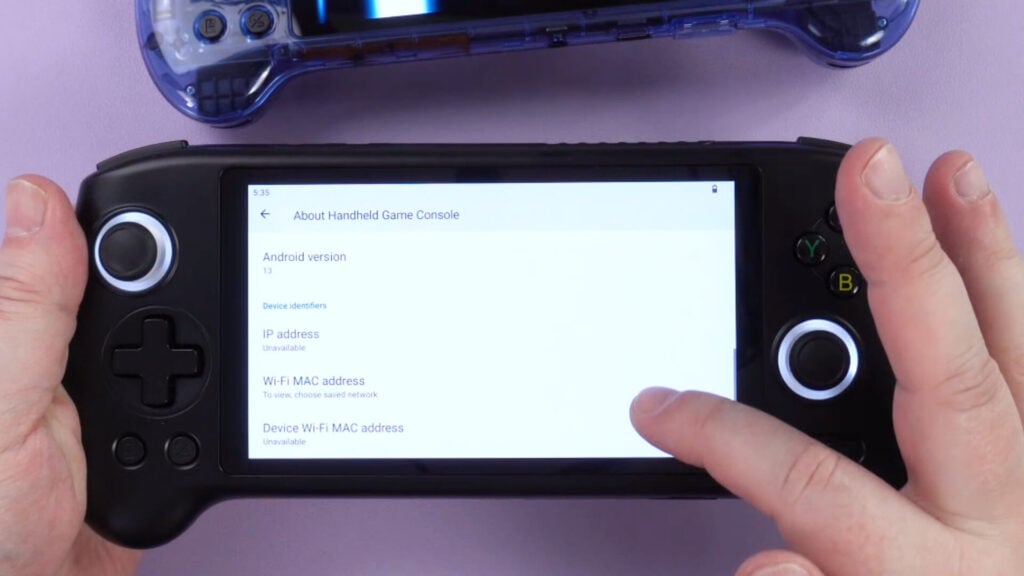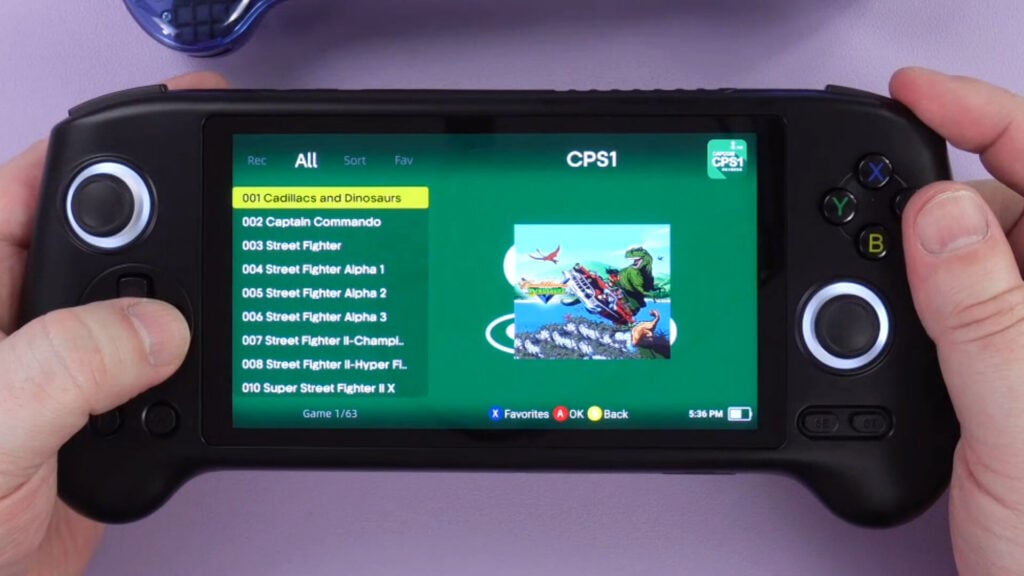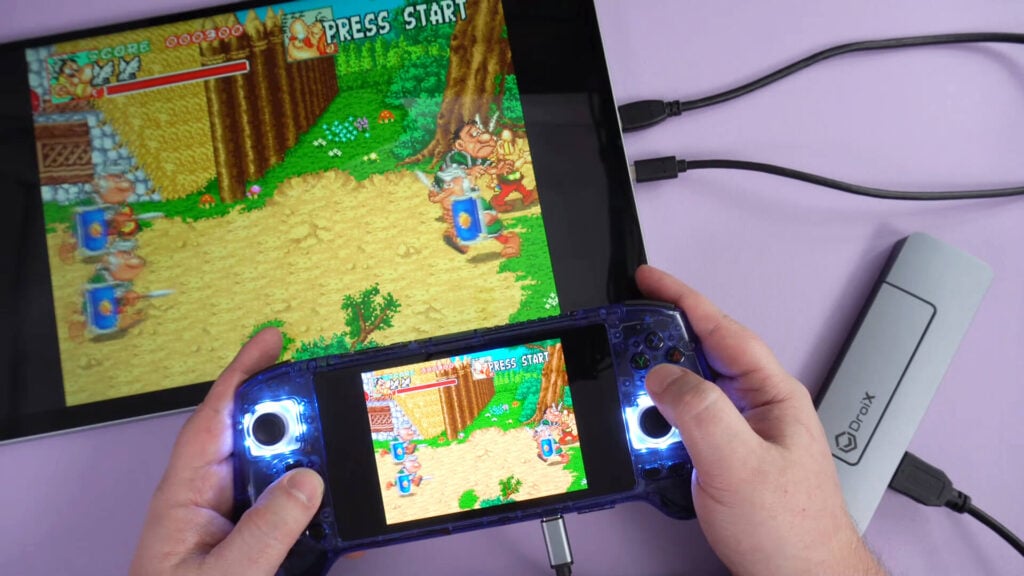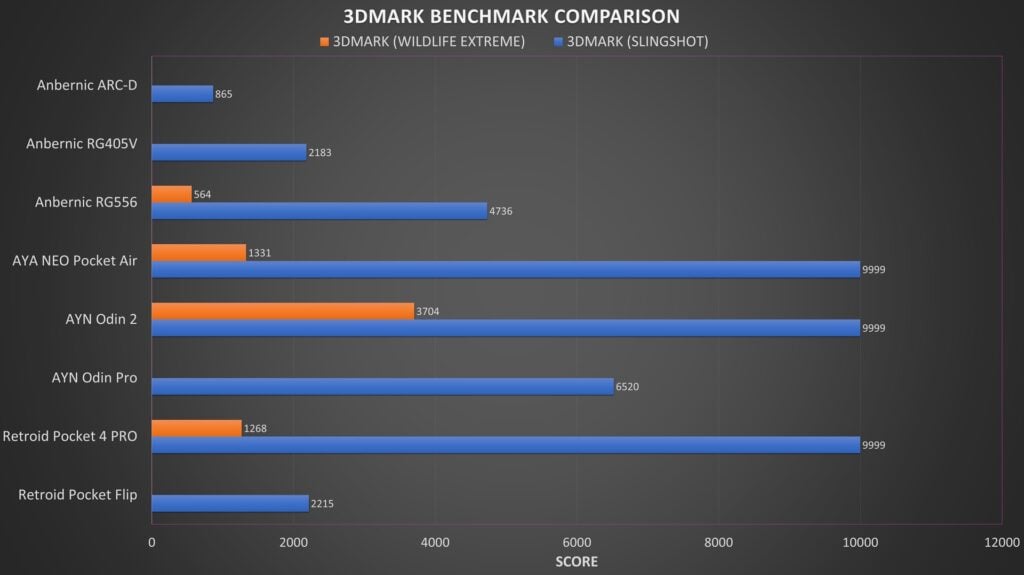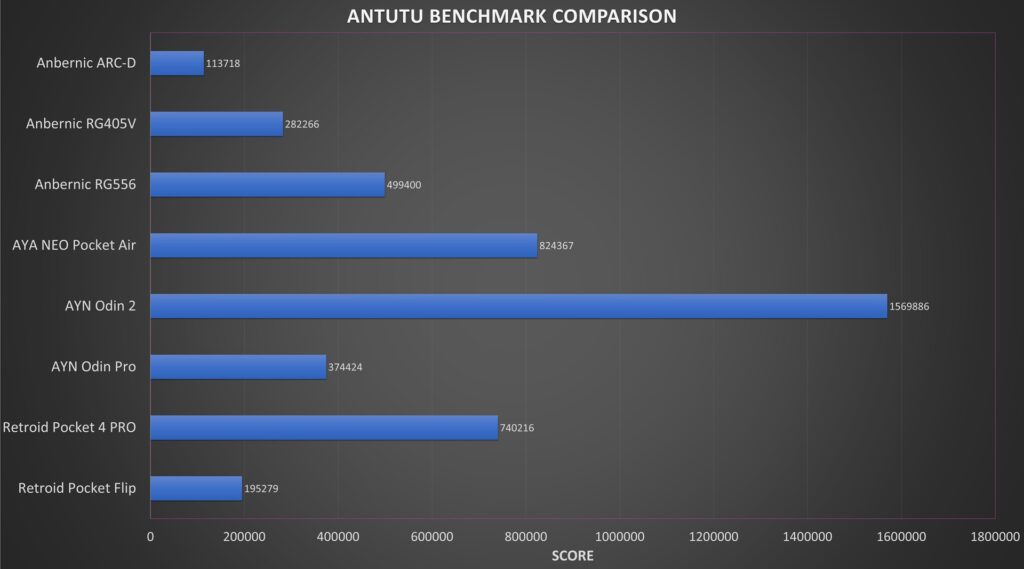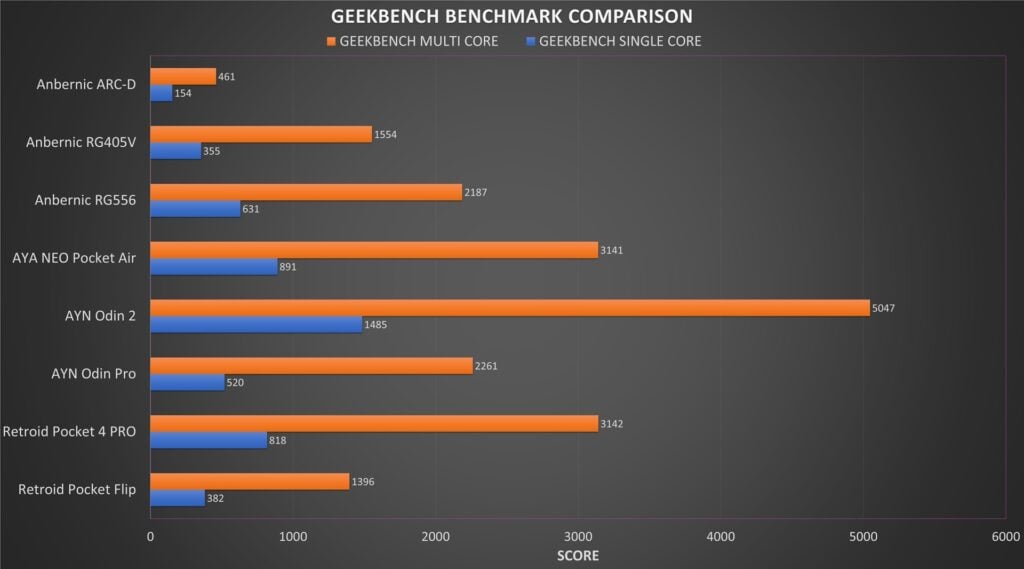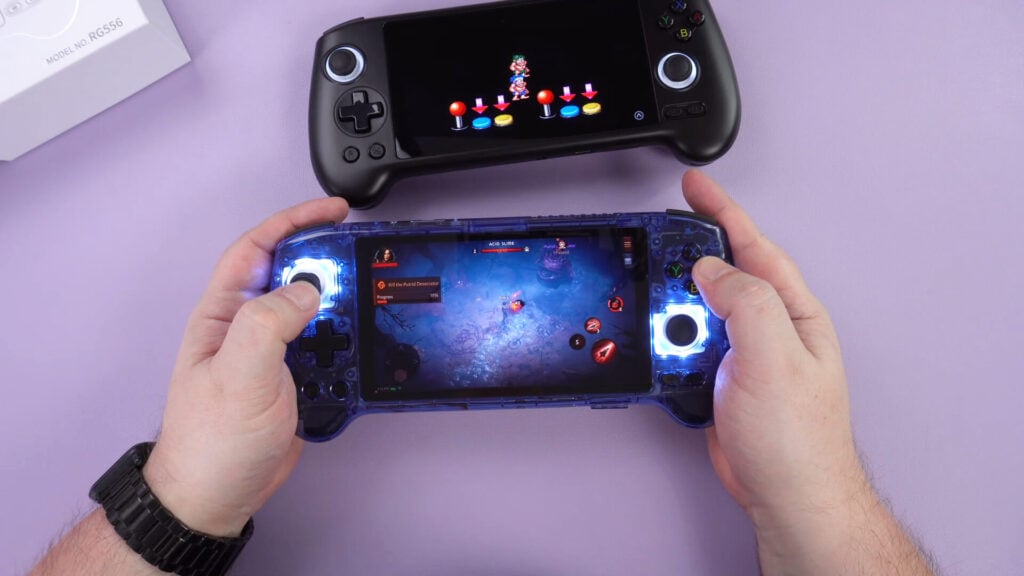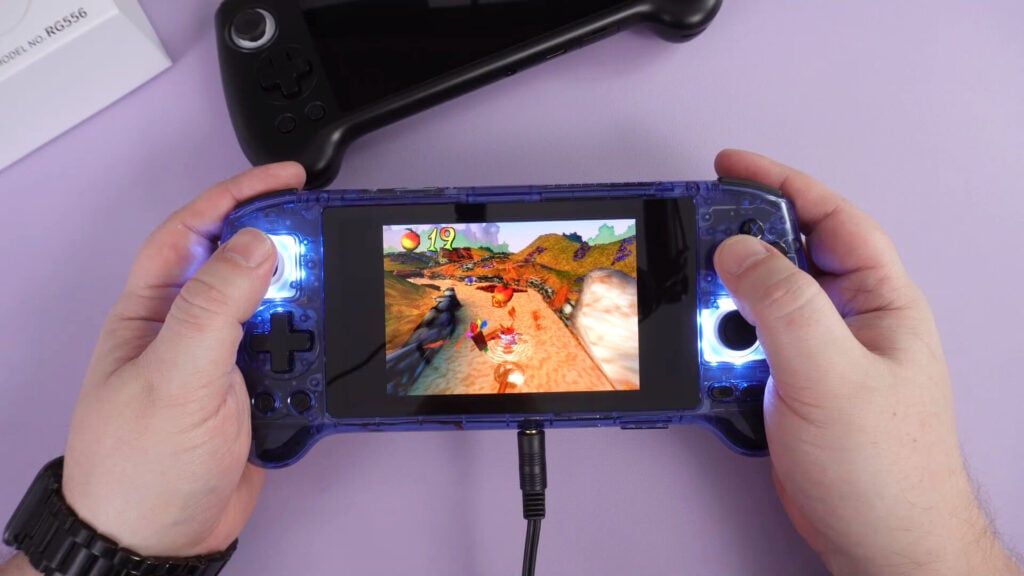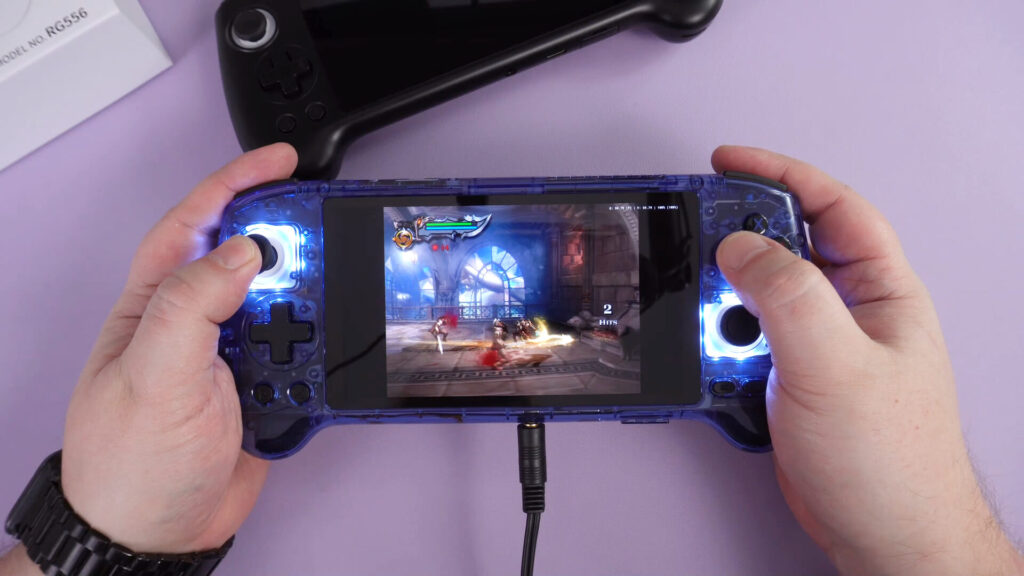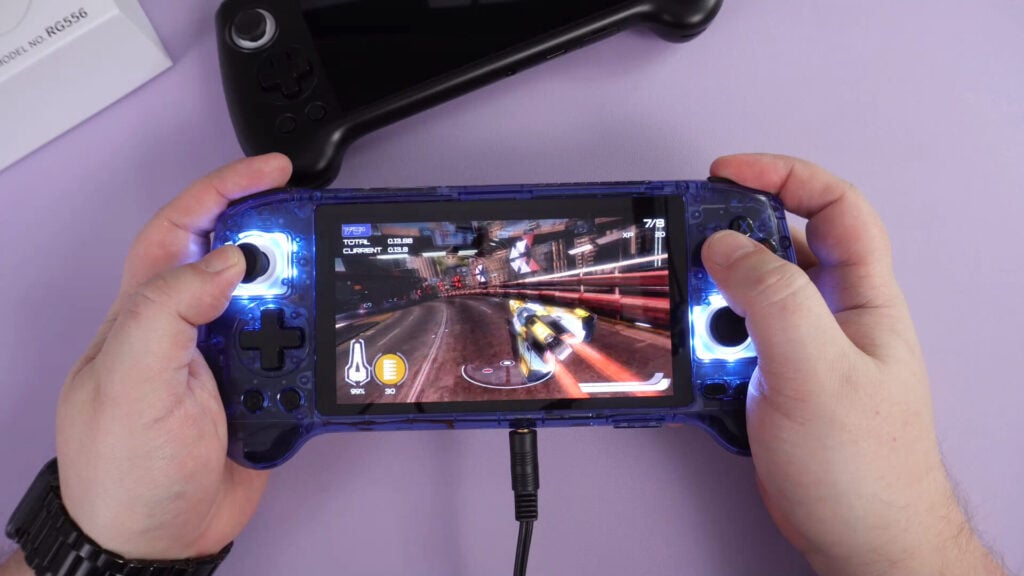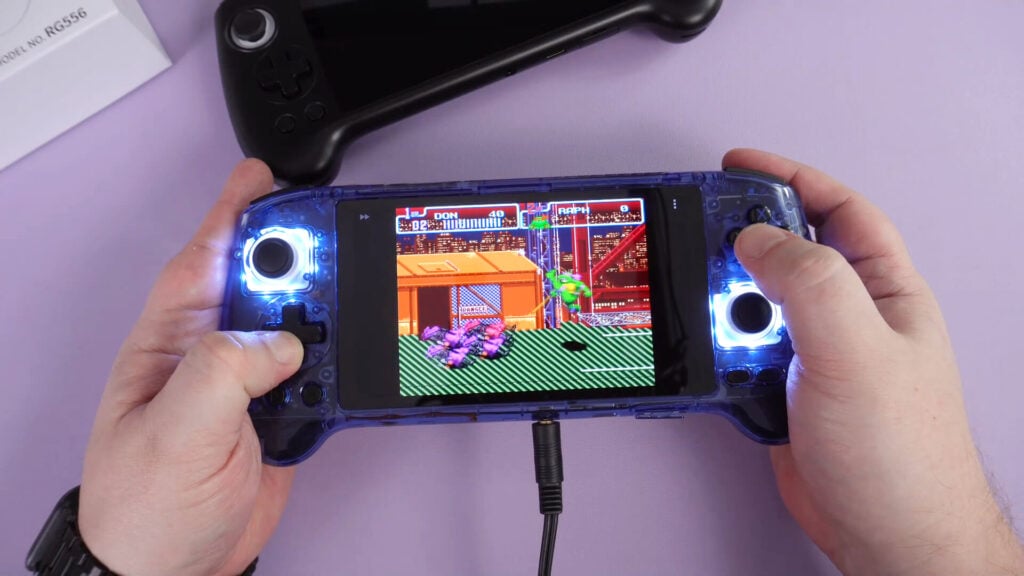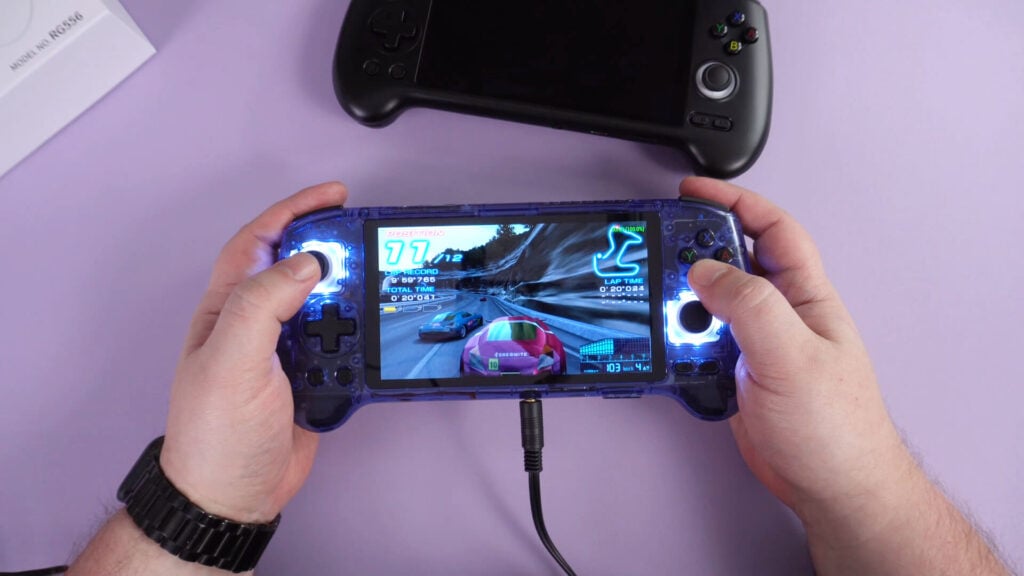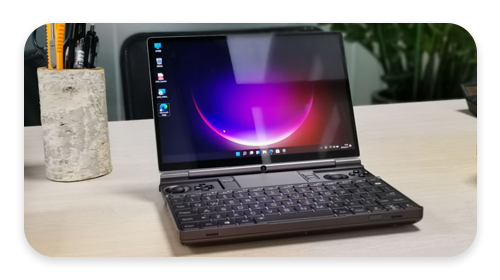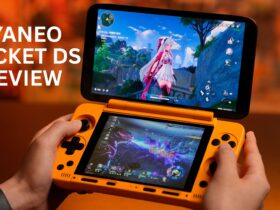Anbernic RG556 anmeldelse
-
Design
(4.5)
-
Build Quality
(4.5)
-
Display
(5)
-
Performance
(4)
-
Features
(4.5)
-
Software
(4.5)
Sammendrag
Anbernic RG556 er en bærbar spillkonsoll som briljerer med sin livlige 5,48-tommers AMOLED-skjerm, som leverer eksepsjonell grafikk for spillere på farten. T820-prosessoren, sammen med Mali-G57 GPU, sørger for en jevn spillopplevelse på tvers av et bredt spekter av Android-spill og emulatorer.
Totalt sett
4.5Brukeranmeldelse
( votes)Fordeler
- Utmerket 5,84″ AMOLED 1080P-skjerm ser krystallklar ut
- God byggekvalitet
- Android 13 og den medfølgende lanseringsprogramvaren kjører veldig bra
- Stille viftestøy og lave temperaturer
Ulemper
- Ikke like høy ytelse som tilsvarende håndholdte enheter
Anbernic RG556 er Anbernics nyeste Android-håndholdte PC rettet mot den øvre enden av markedet. Vil den nye T820-prosessoren være nok til å holde tritt med Dimensity- og Snapdragon-prosessorene som finnes i nyere Android-baserte håndholdte datamaskiner? La oss finne ut av det i vår anmeldelse av Anbernic RG556, når vi pakker den ut av esken, tar en nærmere titt på den håndholdte enheten, kjører noen benchmarks for sammenligning og deretter sjekker ut en hel haug med spill for å se hvordan de presterer.
Anbernic RG556 anmeldelsesvideo
Utpakking av Anbernic RG556
Vi starter vår Anbernic RG556-anmeldelse med en kort unboxing. Først ut av esken er selve Anbernic RG556, som vi snart skal ta en nærmere titt på.
Under emballasjen har vi en brukerveiledning som er på engelsk og kinesisk. Inne i esken ligger det en USB Type-C-kabel for lading. Og sist, men ikke minst, en skjermbeskytter og skjermservietter til når du skal bruke den.
Oversikt over Anbernic RG556
Neste i vår Anbernic RG556-gjennomgang, Anbernic RG556 måler rundt 22,3 x 9 x 1,5 cm (8,7 x 3,5 x 0,5 tommer) og veier 331 g.
Android-spillenheten er tilgjengelig i to farger, svart og gjennomsiktig blå. Materialet er litt forskjellig, det svarte etuiet har en mer matt finish, mens det blå etuiet ser blankt ut og føles blankt i hendene dine.
Skjermen er en 5,48″ AMOLED-berøringsskjerm med en oppløsning på 1080P. OLED-skjermen ser flott ut med fine farger og god lysstyrke. På venstre side har vi hall-effektanaloger og en D-Pad, og under har vi en Function- og Return-knapp. På høyre side er det spillknapper med SELECT og START under den høyre analoge spaken.
På toppen finner du skulder- og hall-effektutløserknappene, etterfulgt av strøm- og volumknappene.
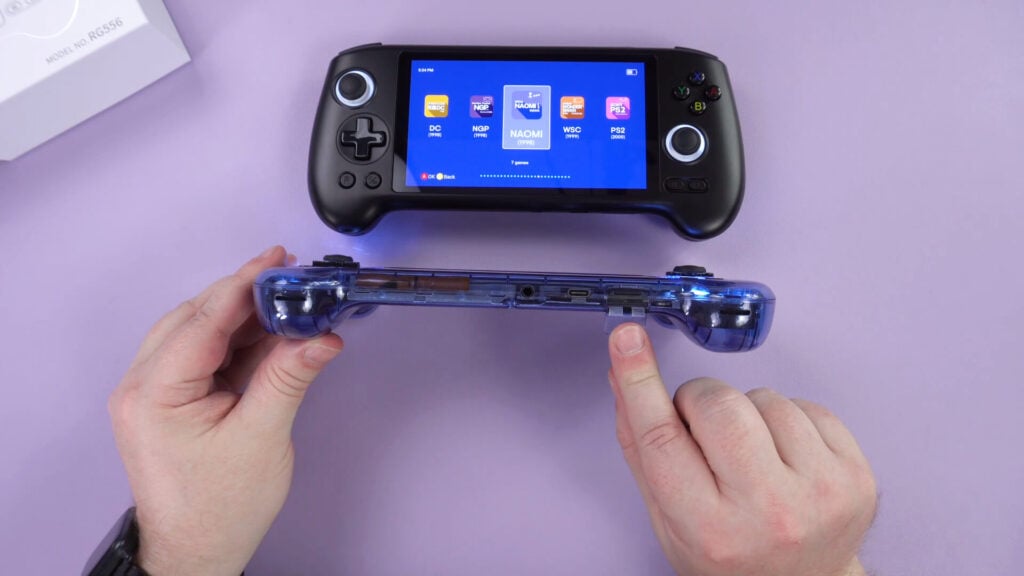
Bunnen har en 3,5 mm hodetelefonport, USB-C Type-port og et tildekket spor for micro SD-kort.
Anbernic RG556 tekniske spesifikasjoner
Neste i vår Anbernic RG556 gjennomgang vi sjekke ut de tekniske spesifikasjonene etterfulgt av batterilevetid, viftestøy og temperaturtester. Anbernic RG556 har Unisoc T820-prosessoren, noe som er første gang vi har sett denne prosessoren, så det blir interessant å se hvordan den presterer sammenlignet med Retroid Pocket 4 PRO og AYN Odin 2-prosessorene.
| CPU | Unisoc T820-prosessor, 6 nm EUV 5G SOC-brikke. Octa-core 1x A76 @ 2,7 GHz, 3x A76 @ 2,3 GHz, 4x [email protected] |
| GPU | Quad Core Mali G57 @850 MHz |
| RAM | 8 GB LPDDR4X |
| OPPBEVARING | 128 GB UFS 2.2 |
| DISPLAY | 5,48-tommers AMOLED-skjerm, OCA full fit 1080*1920 |
| KOMMUNIKASJON | Wi-Fi 6 Bluetooth 5.0 |
| BATTERI | 5500 mAh Polymer litiumbatteri |
| OS | Android 13 |
| ANDRE FUNKSJONER | Innebygd Hall-joystick, seks-akset gyroskopsensor, Hall-utløser, høyhastighetsvifte + varmerør aktiv varmespredning, støtte for FOTA trådløs oppgradering, netplay, streaming, trådløs screencasting, USB Type-C støtter 1080p Display Port-utgang, vibrasjonsmotor, 3,5 mm stereohøretelefoner, energisparende innstillinger, joystick-lyskontroll, lysstyrke på skjermen osv. |
RG556 drives av et oppladbart batteri på 5500 mAh. I testene våre kjørte Antutu i en løkke, og vi fikk litt over fire timer.
Mens vi kjørte Antutu, testet vi også viftestøyen og termikken. Vi fikk 60 dB viftestøy og en høyeste temperatur på rundt 39 grader C. Viften er vanligvis ikke aktiv så ofte med mindre den er veldig stresset, så vi måtte stille den inn på høyeste hastighet manuelt for å få høyest mulig støy.
Oversikt over Android OS
Vi fortsetter vår gjennomgang av Anbernic RG556 med en titt på operativsystemet, dets funksjoner og programvare. Anbernic RG556 kjører Android 13, som er ganske oppdatert. Ved første oppstart har du en kort oppsett skjermen som vil pre-installere noen emulatorer for deg. Jeg vil imidlertid anbefale å gå rett til Play Store for å oppdatere dem, da de var eldre versjoner.
Du kan velge mellom å kjøre de enkelte emulatorene eller bruke Anbernic-startprogrammet til å bla gjennom og spille spillene dine. Hvis du har spill på micro SD-kortet, vil lanseringsprogrammet skanne og legge til spill. Når du har skannet, får du en rekke systemer og spill du kan bla gjennom og spille. Programvaren er ganske enkel, men den er lett å sette opp og bruke og fungerer veldig bra.
Alternativt kan du kjøre emulatorene hver for seg. Dette vil kreve litt mer oppsett, men ofte, spesielt med de mer krevende systemene, er emulatorene mer optimaliserte enn de som brukes i RetroArch for eksempel. Hvis du synes at spillene går tregt i RetroArch, bør du se om det finnes en frittstående emulator som kan hjelpe deg med å forbedre ytelsen - det kan utgjøre en stor forskjell.
I rullegardinmenyen har du alternativer for Keymapping, prosessorhastighetsmodus og viftekontroll. Hvis du ikke er kjent med tastetilordning, kan du tilordne skjermkontrollene til enhetens fysiske kontroller. Den lar deg spille de fleste spill med en kontroller, selv om de ikke har støtte for det.
Videoutgang via USB C støttes. Du trenger en passende dokkingstasjon med HDMI-utgang, for eksempel vår DroiX SD1, eller enda bedre, DroiX NH8 USB-hub med NVME. Og vårt utvalg av bærbare skjermer fungerer utmerket sammen med oppsettet!
Når du er tilkoblet, kan du velge mellom skjermspeiling eller et skrivebordslignende grensesnitt på TV-en med berøringsskjerminngang på enheten. Skjermspeilingsmodusen fungerer perfekt, men vi hadde noen mindre problemer med å komme inn i innstillingsmenyene eller avslutte når vi spilte emulatorer. Alt i alt ser den imidlertid flott ut og spiller flott på en bærbar skjerm.
Systembenchmarks
Siden dette er et Android-operativsystem, kan vi kjøre noen systembenchmarks og sammenligne ytelsen med andre Android-håndholdte spillmobiler som en del av denne anmeldelsen av Anbernic RG556.
3DMARK
Vi starter med 3DMark, som tester CPU- og GPU-ytelsen. I Slingshot-resultatene får vi 4 736 for RG556, det er en gjennomsnittlig poengsum. AYN Odin 2, AYANEO Pocket Air og Retroid Pocket 4 PRO oppnådde alle maks poengsum.
På den mer krevende Wildlife Extreme-referansen får RG556 564 poeng. Selv om det er den laveste poengsummen, er det noen av de håndholdte maskinene med lavere ytelse som så vidt klarer å kjøre referanseindeksen, for ikke å snakke om å få poeng.
Antutu
Antutu er en generell serie med benchmarks som tester alt fra brukergrensesnittets ytelse til lagringshastigheter.
Anbernic RG556 har en respektabel poengsum på rett under en halv million. De dyrere enhetene med høyere ytelse har imidlertid et betydelig forsprang.
Geekbench
Vår tredje og siste referanseindeks er Geekbench, som tester ytelsen til én og flere kjerner.
RG556 oppnår anstendige resultater, også her på fjerdeplass bak de dyrere enhetene, men ikke med store forskjeller.
Sammendrag av referanseindeksen
Anbernic RG556 ligger fortsatt på fjerdeplass bak de mektige Android-spillkonsollene AYN Odin 2, AYANEO Pocket Air og Retroid Pocket 4 Pro. Husk at de to første er minst dobbelt så dyre som RG556, men prisforskjellen med Retroid Pocket 4 PRO er mye nærmere.
Spillytelse
Vi anbefaler å se Anbernic RG556-gjennomgangsvideoen ovenfor for spillopptak. Vi prøvde noen forskjellige spill, blant annet Diablo, Dan the Man, Horizon Chase og Magic Rampage.
Alle spillene kjører helt fint uten forsinkelser eller etterslep. Som nevnt er det innebygd skjermkartlegging, og vi klarte å sette den opp uten problemer.
Emulatorens ytelse
Igjen, vi anbefaler å se Anbernic RG556-gjennomgangsvideoen ovenfor for å se emulatoropptak på et stort antall systemer. I hovedsak vil alle 8bit- og 16bit-systemer til PlayStation 1 og Dreamcast fungere uten problemer. Du vil også kunne oppskalere den interne gjengivelsesoppløsningen til 1080P for å få 3D-grafikken til å se mye jevnere ut.
For de mer krevende systemene fra PlayStation 2 og fremover vil du finne blandet suksess. For PlayStation 2 vil du oppdage at de mer krevende spillene vil kjøre tregt med mindre du senker gjengivelsesoppløsningen. For mindre krevende spill kan du imidlertid øke gjengivelsesoppløsningen og fortsette å kjøre i full hastighet.
For nyere systemer, inkludert håndholdte, vil du igjen ha blandet suksess. På Vita var det for eksempel en god del spill fra de kompatible som kjørte med full 30 eller 60 FPS. Spill som Street Fighter X Tekken kjørte imidlertid med rundt 40FPS.
For den nåværende generasjonen håndholdte PC-er er det bare de mindre krevende 2D-spillene som kan spilles. Hvis du ønsker å emulere på dette nivået, anbefaler vi AYN Odin 2 Pro
Avsluttende tanker
Vi vil oppsummere vår Anbernic RG556-anmeldelse med våre tanker om Android-spillkonsollen. Anbernic RG556 er generelt sett en god retro-håndholdt spillkonsoll, men ytelsen er lavere enn hos Retroid Pocket 4 PRO til samme pris. Men for denne prisforskjellen får du en større 5,48″ AMOLED-skjerm med høy oppløsning, sammenlignet med en 4,7″ IPS-skjerm med lavere oppløsning på 4 PRO. Avhengig av hva du foretrekker, vil du kanskje ha en større eller mindre skjerm, men AMOLED vil slå IPS i kvalitet alle dager i uken.
Vi liker den brukervennlige Anbernic-startprogrammet, som ganske enkelt skanner micro SD-kortet ditt og legger til spill i de aktuelle systemmenyene. Den fungerer utmerket og er rask å komme i gang med. Husk imidlertid at for de mer krevende systemene vil du ønske å bruke de dedikerte appene i stedet for RetroArch-kjernene. De dedikerte appene krever litt oppsett, men ytelsesøkningen du får, er verdt det.
Hvis du er interessert i en større skjerm av høy kvalitet, med et ganske raskt oppsett, er Anbernic RG556 Android gaming-enhet absolutt verdt å vurdere. Hvis du vil ha litt ekstra ytelse, bør du gå for Retroid Pocket 4 Pro.
Du kan lære mer og kjøpe Anbernic RG556 her. Bruk rabattkoden "RG5565OFF" for 5% rabatt, koden utløper en måned etter at denne anmeldelsen er lagt ut og kan ikke brukes under butikksalg eller kampanjer.
Takk for at du har lest (eller sett) vår Anbernic RG556-anmeldelse. La oss få vite hva du synes om denne Android-spillhåndholdte i kommentarene, er det verdt å kjøpe eller ser du på en annen håndholdt?
[azp_custom_product id="14″]




